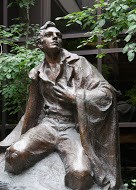
No matter how well one think one know the story of Joseph Smith’s death, church history expert Susan Easton Black probably has you beat.
Black drew a crowd so large that even the overflow seating at the Gordon B. Hinckley Alumni Center almost reached capacity for her session entitled “Joseph Smith: The Refiner’s Fire.” An extremely detailed telling of the steps leading to the martyrdom of Smith enthralled the Education Week audience.
Despite the many contributing factors leading to the death of the Prophet, things took a turn for the worse when the Nauvoo Expositor, a newspaper critical of The Church of Jesus Christ of Latter-day Saints, was destroyed by a mob on June 10, 1844.
Unknown to many, the Nauvoo City Council, including Joseph and Hyrum Smith, spent 14 hours across two days deliberating what to do about the Expositor, and only then concluded that the paper would be labeled a “public nuisance.” Joseph authorized the local sheriff to stop the press from operating, but a mob quickly gathered unbeknownst to Smith and destroyed the entire press.
The following days led to multiple arrest warrants and trials for the destruction and burning of the press, during which time both Joseph and Hyrum were found to be innocent. The warrant came as no surprise to Joseph – he had previously been served 38.
Soon thereafter, a mob began to move a “line of aggression” towards Nauvoo, causing Joseph to declare martial law and activate the the Nauvoo Legion to form a “line of defense.” Four days later, that line of defense was broken by soldiers with Governor Thomas Ford, who served yet another warrant to both Smiths, calling them to Carthage.
The last words of Hyrum to his son indicated the feelings they had towards the situation: “Never forget me, I will die for the truth.” Despite the efforts of Joseph to make that clear, many of his friends and family agreed that there was nothing to fear in Carthage, a sentiment that led to his famous saying, “if my life is of no value to my friends, it is of no value to me.”
Following their arrival in Carthage to stand trial for a third time, Joseph received a promise from Governor Ford that Ford would not travel to Nauvoo without both Smith brothers in an effort to ensure their safety. That promise was reaffirmed to the Prophet multiple times, but later broken by the governor.
Black pointed out the irony that while Joseph and Hyrum Smith were killed in Carthage, Ford had left them to die while travelling to Nauvoo, where he dined with Emma Smith. The audience audibly gasped as Black explained this little known detail of the martyrdom.
As she concluded the story, Black bore testimony of the Prophet and Hyrum Smith.
“I wish that I could say that Joseph and Hyrum [made it] west, but obviously, [they had] a purpose,” said Black. “I know that they were martyrs. I know that they sealed their testimony of the Book of Mormon and the Doctrine and Covenants with their blood.”




